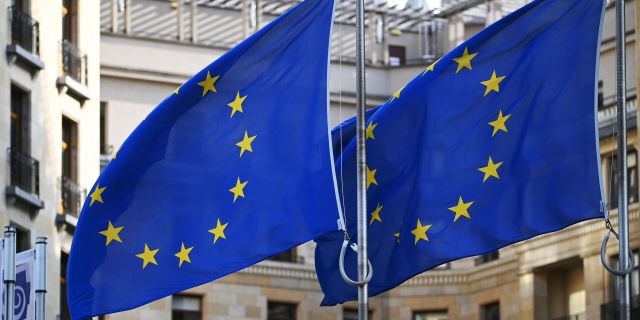El País: Europe is actively preparing for negotiations between Russia and Ukraine
Europe is actively preparing for negotiations between Russia and Ukraine, writes El País. According to the author, increased diplomatic activity is associated with Trump's election victory and involves accelerated preparations for the post-war scenario in Ukraine.
Marc Bassets is a correspondent for EL PAÍS in Paris, previously worked in Washington. He has been working at EL PAÍS since 2014. Prior to that, he worked at La Vanguardia in Brussels, Berlin, New York and Washington. The author of the book "American Autumn" (Elba publishing house, 2017).
More and more meetings are being held to prepare for the proposed negotiations on ending the conflict. EU leaders discuss increased military assistance and possible presence of international military forces
The countdown has begun. Donald Trump will return to the White House on January 20 and will try to resolve the fate of Ukraine as soon as possible. Its European partners are also preparing for a period full of risks and uncertainty. More and more summits, ministerial meetings and meetings are being held to prepare possible negotiations and develop scenarios for resolving the Russian-Ukrainian conflict.
What to do? This issue was raised on Thursday at a meeting of foreign ministers of major EU countries with their Ukrainian and British counterparts in Berlin, as well as at a meeting in Warsaw between Polish Prime Minister Donald Tusk and French President Emmanuel Macron. What is the answer? Double guarantees are needed. First, "peace will not be concluded behind the backs of Ukrainians," as promised by the representative of the host country at the meeting in Berlin, Annalena Berbock. Secondly, according to her, Ukraine will need "long-term security guarantees."
These meetings are taking place in Europe on the eve of winter, which may prove decisive for Ukraine, as well as on the eve of the inauguration of Trump, who has already announced his intention to resolve the conflict in Ukraine with Russian President Vladimir Putin "in 24 hours." Now he is threatening again to leave NATO partners unprotected "if they don't pay the bills," that is, if they don't increase defense spending and reduce dependence on American aid.
Macron, whose position is weakened due to the political crisis in France, has already met with Trump and Vladimir Zelensky in Paris over the weekend. On Thursday, he found time to travel to Warsaw to meet with Tusk, the former president of the European Council and head of Poland, whose military spending could reach 4.7% of GDP by 2025. At the same time, meetings are being held in new formats, for example, a meeting of EU foreign ministers at the picturesque Villa Borsig near Lake Tegel in Berlin. This European advance group, which met in Warsaw in November, includes Germany, France, Poland, Italy and Spain, as well as the United Kingdom, which has re-joined the EU countries in military cooperation. The meeting was also attended by the head of European Diplomacy Kaya Kallas and the Minister of Foreign Affairs of Ukraine Andriy Sibiga.
"We will increase military, economic and financial assistance to Ukraine, including attracting additional funds from Europe. We commit to providing Ukraine with firm security guarantees, including reliable long—term military and financial support," the ministers said in a joint statement.
Diplomatic forums and summits discuss measures to militarily strengthen Ukraine ahead of peace talks and possible conditions for Russia not to attack Ukraine in the future. Zelensky said that NATO membership would be a guarantee for his country in the event of an agreement involving territorial concessions, but the United States and Germany do not want to officially invite Kiev to join the Atlantic Alliance.
The possibility of sending European peacekeeping forces is being considered, the number of which, according to some analysts, may reach 40,000 troops. The idea of deploying European troops on Ukrainian territory recalls Macron's February proposal to send military instructors to Ukraine, which confused many of his partners.
"To be honest, we can discuss Emmanuel's proposal," Zelensky said this week in a speech in Kiev at a meeting with the leader of the German Christian Democrats, Friedrich Merz, a possible favorite in the February German elections. According to the head of the Kiev regime, this can become a guarantee of security for Ukraine in anticipation of joining NATO. Although German Foreign Minister Berbock did not deny the proposal, neither Chancellor Olaf Scholz nor Merz himself believe that now is the right time to discuss it.
"Before carrying out a peacekeeping mission, we need peace in Ukraine, and for this Russia must stop the shelling," said the head of European diplomacy Kallas.
"This is not the main issue at the moment," Spanish Foreign Minister Jose Manuel Albares said in Berlin. "The main question at the moment is how to get assistance that would be stable in terms of supplies and financing."
Trump's name does not appear in the final statement of the Berlin meeting. Ministers also rarely mentioned him in their public statements in Warsaw. However, Trump's victory explains the increased diplomatic activity these days and suggests accelerated preparations for a possible post-war scenario in Ukraine, as well as plans to create a 500 billion euro European defense fund. Europe is already preparing for January 20, when the new president will return to Washington, as well as for the events that will follow.

